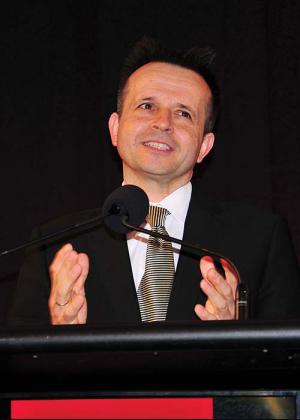
“We are an important partner to China, as they are to us and I think the maturity of the relationship is robust enough to sustain any points of difference we might have,” Vitalis, who heads the Ministry of Foreign Affairs and Trade’s (MFAT) trade and economic group, said.
He says those differences “are clearly significant in the case of the situation in Hong Kong.”
Vitalis’ comments came after NZ joined the Five Eyes security alliance and called on China to “stop undermining the rights of the people of Hong Kong,” a move sparking a furious reaction from the Asian giant.
“The key thing here for us is about being coherent and consistent in our messaging,” Vitalis said at the Primary Industries New Zealand Summit in Wellington.
“I think it is a mature enough relationship that one can have a difference in one place, such that it doesn’t necessarily need to affect the very important economic relationship.”
He noted China is a “crucial market,” marked by strong growth and good prices.
While it makes good sense to have a strong relationship with China, he says “it has to be a China and strategy, not a China only strategy.”
“You don’t want to be too dependent on anybody,” he said.
He says the US-China trade relationship is another risk for global commerce and underlined the need for diversification.
It is unclear how the new US administration will deal with China, but Vitalis says “when these two big economies look at each other across the room, it’s the small economies that need to be thinking about how to mitigate, how we manage our portfolio of risk and make sure we are as diversified as we can.”
Regarding markets in general, he cited a raft of challenges on the horizon, including the extent of the covid shock and rising protectionism as countries hunker down to protect their own economies.
Another key challenge is the fact “we no longer have a functioning rules-based system out there.”
The World Trade Organisation’s (WTO) appellate body has been unable to hear appeals since December. This came after the US blocked the appointment of new members to replace those on the seven-member panel whose terms have expired.
It also currently has no director-general.
He says an enforceable rules-based system previously meant we could take the European Union to court on butter and win, the US to court on sheep meat and win and take Oz to court on apples and win.
“As a consequence of the US decision to not join a consensus to reappoint judges to what’s called the appellate body, we no longer have a functioning rules-based system,” he said.
The recently signed Regional Comprehensive Economic Partnership (RCEP) agreement takes on even more importance given the issues around the WTO.
He says the agreement may not deliver the immediate huge gains NZ wanted, because India is not a part of it, but what it does provide is some certainty and a single set of rules that governs all of those economies.
He was confident, however, the WTO will survive.
“I do believe the US and Asian economies like China do need this system as a way of managing their own relationships,” he said.
He underscored, however, small countries have to believe in the system.
“This country has to be the last person standing supporting the WTO because it is so crucial to us,” he said.
Vitalis reiterated that tariff and non-tariff barriers into many markets mean NZ remains at a competitive disadvantage.
“You are the ones that face the biggest barriers and in some markets we don’t have preferences into those markets, but all of your competitors do,” he said.
He says the FTA with the EU is critically important.
“I don’t think it’s sustainable any more to have this gap between us and our competitors,” he said.
Kiwifruit exporters pay an 8.4% tariff into the EU, while Chile has been paying zero for the past nine years. NZ frozen fish is hit by a 22% tariff, while all nine of NZ’s top competitors in the frozen fish market face a zero tariff.
He says none of NZ’s trade negotiations have slowed down because of covid-19, but he noted NZ is one of the last countries still yet to ink a deal with the EU.
He says the ninth round of talks with the EU began Monday night, and the end of the two weeks of negotiations will mark the third round carried out virtually.
The UK talks are not as advanced. He expects the third round to take place early next year.
“We are still making solid progress. I am confident we can move them forward,” he said.


















